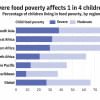Nearly 3 out of 4 youths in 92 countries lack employable skills

Nearly three quarters of young people – aged 15 to 24 – in 92 countries with available data are off-track to acquire the skills needed for employment.
Data highlights low levels of skills among young people across all age groups – with youths in low-income countries the least likely to have the skills required to thrive – particularly in future employment opportunities, decent work, and entrepreneurship, according to a new report published today (July 14) by the Education Commission and Unicef ahead of World Youth Skills Day tomorrow.
"An inspired, skilled generation of children and young people is critical for prosperity, progression, and the success of societies and economies. Yet, the majority of children and young people across the world have been failed by their education systems, leaving them uneducated, uninspired, and unskilled – the perfect storm for unproductivity," said Unicef Director of Education, Robert Jenkins.
With high rates of out-of-school young people and low attainment of secondary-level skills, countries worldwide are facing a skills crisis, with the majority of youths unprepared to take part in today's workforce, reads the report.
In at least one in three low-income countries with available data, more than 85 percent of young people are off-track in the secondary-level, digital, and job-specific skills attainment.
"To give young people the best chance to succeed and recover learning losses due to the pandemic, we need to support them holistically. We need to know where children and youth are in building the range of skills they need and monitor their progress," said Education Commission Executive Director, Liesbet Steer.
Data from 77 countries showed that less than three-quarters of children aged between three and five years old are developmentally on track in at least three out of the four domains of literacy-numeracy, physical, social-emotional, and learning.
At approximately 10 years old, the majority of children in low- and middle-income countries are unable to read and understand a simple text, the report added.
The report outlined the need for more extensive data on the skills gap among children and young people across all age groups.

 For all latest news, follow The Daily Star's Google News channel.
For all latest news, follow The Daily Star's Google News channel. 








Comments